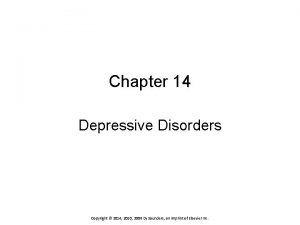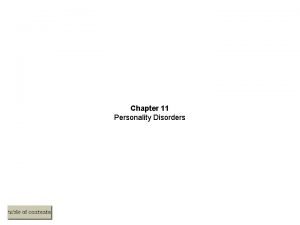Stressful Life Events Correlate with Depressive Symptoms Michelle

- Slides: 1

Stressful Life Events Correlate with Depressive Symptoms Michelle M. Meng 1, Miranda N. Jany 1, & Carissa L. Philippi 1 of Psychological Sciences, University of Missouri-St. Louis 1 Department Introduction ❏ Stressful life events, such as abuse, divorce, or spending time in jail, have been known to cause psychological and physical symptoms, such as depression (1). ❏ Previous research has examined the association between the amount of stressful life events and the onset of depression (2). Results ❏ Conclusions Hypothesis ❏ There was a small/weak positive correlation between the number of life stressors and depressive symptoms, r(221) =. 26, p <. 01. ❏ The number of stressful life events will be positively correlated with depressive symptoms. ❏ Results suggest that stressful life events do not always cause depressive symptoms. Participants with a low amount of life stressors were still showing depressive symptoms. References 1. Methods & Materials Participants ❏ UMSL students (N = 223) completed online questionnaires as a part of a larger study. Materials ❏ ❏ 2. The Beck Depression Inventory (BDI): a 21 item, self -report inventory that measures symptoms of depression (3). Life Stressor Checklist-Revised (LSC-R): a self-report measure that assesses exposure to 30 traumatic or stressful life events (4). Statistical Analysis ❑ A correlation was conducted for total LSC-R and BDI scores. 3. 4. 5. Billings, A. G. , & Moos, R. H. (1982). Stressful life events and symptoms: A longitudinal model. Health Psychology, 1(2), 99– 117. doi: 10. 1037/02786133. 1. 2. 99 Kendler, K. S. , Karkowski, L. M. , & Prescott, C. A. (1999). Causal Relationship Between Stressful Life Events and the Onset of Major Depression. American Journal of Psychiatry, 156(6), 837– 841. doi: 10. 1176/ajp. 156. 6. 837 Smarr, K. L. , & Keefer, A. L. (2011, November 7). Measures of depression and depressive symptoms: Beck Depression Inventory‐II (BDI‐II), Center for Epidemiologic Studies Depression Scale (CES‐D), Geriatric Depression Scale (GDS), Hospital Anxiety and Depression Scale (HADS), and Patient Health Questionnaire‐ 9 (PHQ‐ 9). Retrieved from https: //onlinelibrary. wiley. com/doi/epdf/10. 1002/acr. 20556 Wolfe, J. , Kimerling, R. , Brown, P. , Chrestman, K. , & Levin, K. (1997). The Life Stressor Checklist-Revised (LSC-R) [Measurement instrument]. Available from http: //www. ptsd. va. gov Folkman, S. , & Lazarus, R. S. (1986). Stress processes and depressive symptomatology. Journal of Abnormal Psychology, 95(2), 107– 113. doi: 10. 1037/0021 -843 x. 95. 2. 107 Limitations ❏ We ask participants to be as truthful as possible which can be difficult when it is a self-report process. How people process the stress they encounter affects how high or low their depressive symptoms are appraised (5). Future Directions ❏ Could include investigating age and sex differences in relation to stress and depression to see if there is a stronger correlation.

